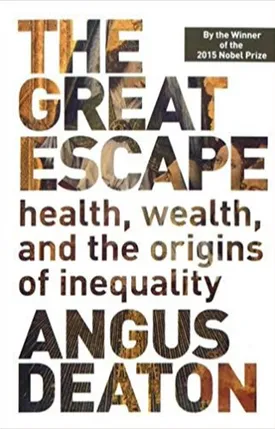The Great Escape: Health, Wealth, and the Origins of Inequality by Angus Deaton
Every society is marked by a large degree of economic inequality, and Angus Deaton's The Great Escape: Health, Wealth, and the Origins of Inequality explores the origins of this inequality and its effects on individuals and communities. In the book, Deaton provides a comprehensive exploration of the economic and social forces at work in the creation and perpetuation of inequality.
The book begins with a discussion of the history and roots of inequality, beginning with the concept of “survival of the fittest,” and how it has been used to explain and perpetuate inequality. In Deaton’s view, inequality is an evolutionary outcome of human societies, with those that survive being the “fittest” in terms of their resources, abilities, and capacity for adaptation. Taking the idea further, Deaton then goes on to examine the ways in which societies and individuals with more resources have been able to “escape” from more dire economic and social circumstances.
Next, Deaton discusses the economic consequences of inequality and looks at the ways in which it affects individuals and communities, as well as the implications for society at large. He argues that inequality can lead to a range of negative outcomes, including increased crime and violence, decreased social mobility, and increased poverty. He also discusses some of the potential solutions to these problems, including reduced taxation, increased spending on education and social services, and greater investment in infrastructure.
Deaton then examines the effects of inequality in terms of health and well-being, discussing the ways in which unequal access to health care and other services can affect quality of life. He looks at the impact of inequality on the development and efficiency of healthcare systems, as well as the ways in which lower rates of mortality and morbidity can contribute to improved health outcomes. Additionally, he examines the role of technology and global trade in amplifying inequality.
In the final chapters of the book, Deaton examines the ways in which public policy can be used to address inequality, including taxation, regulation, and social programs. He argues that governments should take a more active role in tackling inequality, and highlights the need for policies that are sensitive to the diverse needs of different populations.
Overall, The Great Escape: Health, Wealth, and the Origins of Inequality paints a vivid picture of the complex social and economic forces at play in creating and perpetuating inequality. Using a wealth of data and research, Deaton provides a comprehensive overview of the history and nature of inequality, and examines the ways in which it can be addressed through public policy. With this book, he offers an invaluable insight into a challenging and timely subject, and makes a compelling argument for the need for greater efforts to tackle growing inequality.

